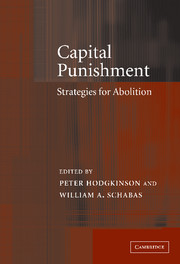Book contents
- Frontmatter
- Contents
- List of figures
- List of tables
- Notes on the contributors
- 1 Capital punishment: improve it or remove it?
- 2 International law and the death penalty: reflecting or promoting change?
- 3 Doctors and the death penalty: ethics and a cruel punishment
- 4 Replacing the death penalty: the vexed issue of alternative sanctions
- 5 Religion and the death penalty in the United States: past and present
- 6 On botched executions
- 7 Death as a penalty in the Shari'ā
- 8 Abolishing the death penalty in the United States: an analysis of institutional obstacles and future prospects
- 9 Capital punishment in the United States: moratorium efforts and other key developments
- 10 The experience of Lithuania's journey to abolition
- 11 The death penalty in South Korea and Japan: ‘Asian values’ and the debate about capital punishment?
- 12 Georgia, former republic of the USSR: managing abolition
- 13 Capital punishment in the Commonwealth Caribbean: colonial inheritance, colonial remedy?
- 14 Public opinion and the death penalty
- 15 Capital punishment: meeting the needs of the families of the homicide victim and the condemned
- Index
13 - Capital punishment in the Commonwealth Caribbean: colonial inheritance, colonial remedy?
Published online by Cambridge University Press: 22 September 2009
- Frontmatter
- Contents
- List of figures
- List of tables
- Notes on the contributors
- 1 Capital punishment: improve it or remove it?
- 2 International law and the death penalty: reflecting or promoting change?
- 3 Doctors and the death penalty: ethics and a cruel punishment
- 4 Replacing the death penalty: the vexed issue of alternative sanctions
- 5 Religion and the death penalty in the United States: past and present
- 6 On botched executions
- 7 Death as a penalty in the Shari'ā
- 8 Abolishing the death penalty in the United States: an analysis of institutional obstacles and future prospects
- 9 Capital punishment in the United States: moratorium efforts and other key developments
- 10 The experience of Lithuania's journey to abolition
- 11 The death penalty in South Korea and Japan: ‘Asian values’ and the debate about capital punishment?
- 12 Georgia, former republic of the USSR: managing abolition
- 13 Capital punishment in the Commonwealth Caribbean: colonial inheritance, colonial remedy?
- 14 Public opinion and the death penalty
- 15 Capital punishment: meeting the needs of the families of the homicide victim and the condemned
- Index
Summary
Capital punishment continues to operate in Caribbean countries which were formerly part of the British Empire and which now enjoy independent status within the Commonwealth. Although the substantive law and procedure relating to the death penalty in each of the states differs to some extent, the death penalty in these countries still bears many of the hallmarks of the English practice of capital punishment. Moreover, the vast majority of Caribbean Commonwealth countries retain the Judicial Committee of the Privy Council (or ‘Privy Council’) in London as their highest court. It is therefore possible to generalise about the operation of the death penalty in the region in terms of both procedure and jurisprudence.
This chapter will consider the use of the death penalty in the Caribbean from an historical and jurisprudential perspective, focusing in particular on selected important constitutional law appeals to the Privy Council. It will also consider the political response to the growing international scrutiny of the death penalty in the region. Before considering these issues, however, it is necessary to consider the procedural steps between conviction and execution in the Caribbean.
The capital punishment process in the Caribbean
The death penalty is available in the Caribbean as a punishment upon conviction for murder and a limited number of other offences (for example, treason). Until 2001, the death sentence was mandatory upon conviction of a capital offence.
- Type
- Chapter
- Information
- Capital PunishmentStrategies for Abolition, pp. 282 - 308Publisher: Cambridge University PressPrint publication year: 2004



